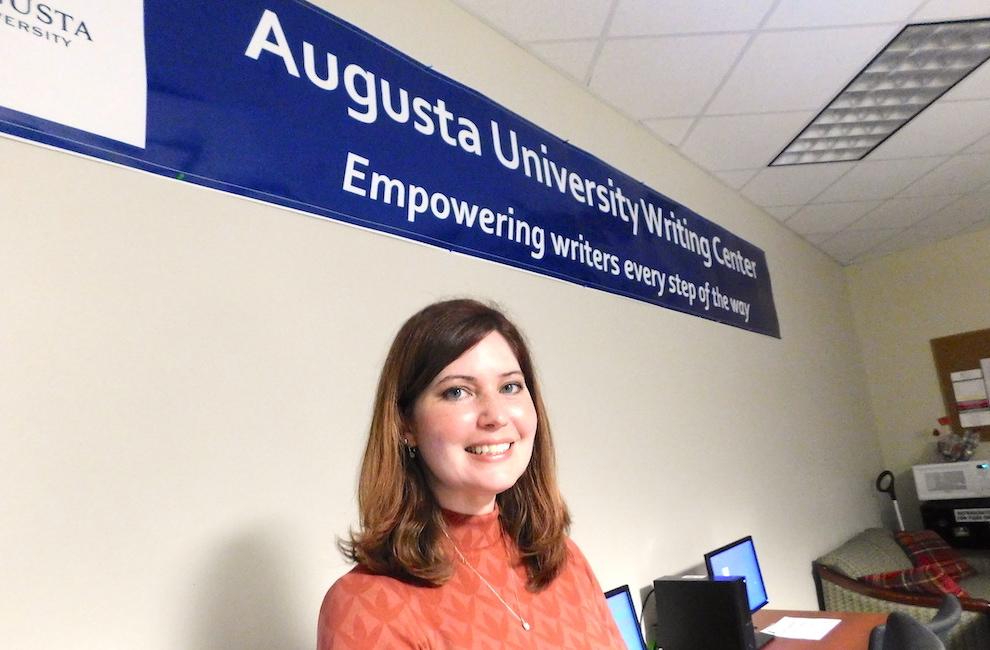When Ian Cyr, a senior majoring in communication, began an internship with the Augusta University Writing Center in fall 2020, he was pleasantly surprised by the variety of students who utilized the center.
“One of my favorite parts about working here at the Writing Center is the fact that we get to interact with so many different majors across the university,” Cyr said, adding he began working as a paid employee in 2021. “I’ve helped with creative writing, grad school applications, scholarship essays and even people’s own personal writing projects because they just wanted some help.”
The Writing Center’s mission is to help students, faculty, post-doctorates and staff at Augusta University improve their composition skills through personalized instruction and support.
Staff and interns at the Writing Center assist with writing, multimodal projects and oral presentations for any subject or discipline at any stage in the writing process, explained Dr. Candis Bond, an associate professor of English and the director of the Writing Center at Augusta University.
Students and faculty are offered one-on-one consultations, either in-person or via live online chats, as well as the opportunity to receive written feedback, she said.
“Our mission is really simple. It is to help all writers, regardless of their rank, their major, their discipline or their ability, to improve their writing and communication skills,” Bond said. “We are writer-centered for that reason, because we recognize that writing as a skill is not content knowledge and, just like any other skill, such as playing a sport or learning to play an instrument, the only way to get better is to consistently practice.”
The Writing Center is available at both the Summerville Campus at Allgood Hall in room N204 and the Health Sciences Campus, upstairs in the Greenblatt Library. Both locations began accepting in-person and online appointments this week and will remain open until May 2, Bond said.
“At the Writing Center, we do anywhere between 2,500 and 3,000 one-on-one consultations a year,” Bond said, adding that does not include students who simply stop by the Writing Center to study. “For the past two years, the appointments have been split pretty evenly. About 50% of those appointments are graduate students and faculty members and 50% are undergraduates.”
Future growth at the Writing Center
With the support of several colleges on campus, the Faculty Senate, The Graduate School and the Office of the Provost, Bond said Augusta University plans to expand the Writing Center. Additional full-time staff will assist with the growing demand for both in-person and virtual appointments, as well as written feedback from consultants.
The Writing Center has recently posted openings for a full-time administrative assistant, an associate director and three professional writing consultants with plans to post additional positions in the next fiscal year.

“When we initially began offering the written feedback service to grad students and faculty in 2018, that really caused our graduate and faculty appointments to take off,” Bond said. “I realized very quickly that this was a high-demand type of support. We immediately began seeing repeat users and they were making leaps and bounds in their writing. It was really helping them.”
Therefore, in December 2019, Bond approached the chair of the Department of English and World Languages at Pamplin College with an idea.
“The chair was Dr. Rhonda Armstrong at the time and I presented to her a visual model of what an expanded writing center might look like,” Bond said. “It was basically having somebody at the top, but then dividing it into a graduate writing center and an undergraduate writing center.”
The plan was to staff the graduate side with professional consultants who have advanced degrees and experience working with graduate students primarily in the STEM (science, technology, engineering, and mathematics) fields. The undergraduate side of the center would continue to be staffed by undergraduate peer consultants, Bond said.
The goal was to design a center that would be unique to Augusta University, but that would also provide a new model of writing support for other writing centers across the country to emulate, she said.
“It was a pretty ambitious plan and Dr. Armstrong was very receptive, but then COVID hit the next year,” Bond said, explaining the pandemic delayed the plan. “But, by the fall of 2020, I shared the same plan with our new chair, Dr. Seretha Williams, and she was also very supportive. That prompted me to take the plan to the dean, Dr. Kim Davies.”
Davies fully embraced the idea and began advocating for the concept of the expanded Writing Center, Bond said.
“From there, we started to think about how we could collaborate and partner with the 10 colleges and schools to really make writing a priority on campus,” she said. “Dr. Jennifer Sullivan, the dean of The Graduate School, was a huge advocate as well. She jumped right in and showed me how the idea could be expanded to have more staffing and support. It was a really nice, concerted effort that showed the university, as a whole, cared about writing and wanted to make it more of a priority for students, faculty and staff.”
Reaching more students and faculty
When Dr. Neil J. MacKinnon, provost and executive vice president for academic affairs at Augusta University, was hired last January, Bond said he visited the Writing Center to fully understand its mission.
“The provost played a major role in helping us get approval for some of the things we requested and I’m incredibly grateful for his support,” she said. “He worked hard to ensure we got some of the things that we needed to continue doing the good work we were already doing and to expand that support in the future.”
As the Writing Center moves forward with additional staffing, in addition to increasing offerings for one-on-one writing support, Bond plans to implement professional development opportunities for faculty focused on how to integrate writing into their programs and classrooms.
The Writing Center can play a role in helping programs design innovative, writing-enriched curricula and can offer resources for faculty who want to incorporate writing-to-learn activities and other communication projects into their courses, Bond said. The Writing Center also plans to add more workshops, writing and publishing boot camps, and writing groups to support scholarly productivity at all levels of the university.
“I really want the Writing Center to become the place people turn to when they’re looking for advice on writing, whether that’s composing themselves, teaching writing or thinking about curriculum development and assessment,” Bond said.
As expansion takes place, Bond said she is also working to reach more students and faculty members by trying to correct some misconceptions about the Writing Center.
“One misconception is that only bad writers use the Writing Center,” Bond said. “That’s not true. As part of this expansion, we’re in the process of renaming the Writing Center the Center for Writing Excellence. The reason we wanted to rename it is to send the message that seeking support on your writing is a normal writing activity; research has established that writing is a social activity that requires collaboration, and we know the most prolific writers seek feedback throughout their process. So, no matter how good or bad you feel you are at writing, everybody can always get better. We are here to normalize that social writing process.”
The new Center for Writing Excellence is for writers on all different levels, Bond said.
“We do, of course, love to work with people who feel that they’re struggling or who need that extra support, but our most frequent users are actually students who are excelling already,” she said. “They are students who just recognize the value of talking about their writing with other people in order to make it better.”
Another myth is people often think they must have a full draft of a paper when they make an appointment with the Writing Center, Bond said.
“I think they feel like they need to show up with something that somebody can look at, but actually our most productive appointments happen when people haven’t written anything at all,” she said. “During those appointments, we just sit down and talk about the task and what needs to happen. Therefore, meeting with us early to talk through things and brainstorm, I think really saves students a lot of time in the long run, because then they start writing with a clear plan in mind.”
In addition, students and faculty members who contact the Writing Center for assistance are informed from the beginning that learning to improve their writing is a slow and personalized process, Bond said.
“Sometimes students come to us and say, ‘I just want to get an A on this paper,’” Bond said, chuckling. “We can’t really be grade-focused in that way. We have to help the students see these are skills they need to develop. Realistically, it’s going to take some time. And it’s really wonderful to see students change their thinking from that external motivation of a grade to the internal motivation of, ‘I really do want to improve and get better over time.’”
Finally, Bond stressed that the Writing Center is not just for English majors.
“One major misperception is that writing centers are only for English majors or they are only for people in the humanities,” Bond said. “Actually, we staff people across all disciplines. We have people from biology, psychology, criminal justice, English, communication, physics, math, information technology and computer science. So, our staff has a broad range of expertise. We also see writers from all disciplines, with our most frequent users coming from the College of Science and Mathematics and the College of Nursing.”
While working at the Writing Center, Cyr said it has been remarkable to see the long-term improvements that students and faculty members can achieve in their writing.
“It’s definitely a rewarding experience because people frequently come back to see us, so we’re not just helping with an individual assignment — we’re helping improve their writing as a whole,” Cyr said. “It’s truly a collaborative experience.”
Visit the Augusta University Writing Center’s website for more information on scheduling an appointment and the services offered.
LikeLikeLoveHahaWowSadAngry4 Tagged asCandis BondEnglish and World LanguageshomepageIan Cyrjagwire homepageJennifer SullivanKim DaviesLike No OtherNeil MacKinnonPamplin CollegeRhonda ArmstrongSeretha WilliamsThe Graduate SchoolWriting Center



